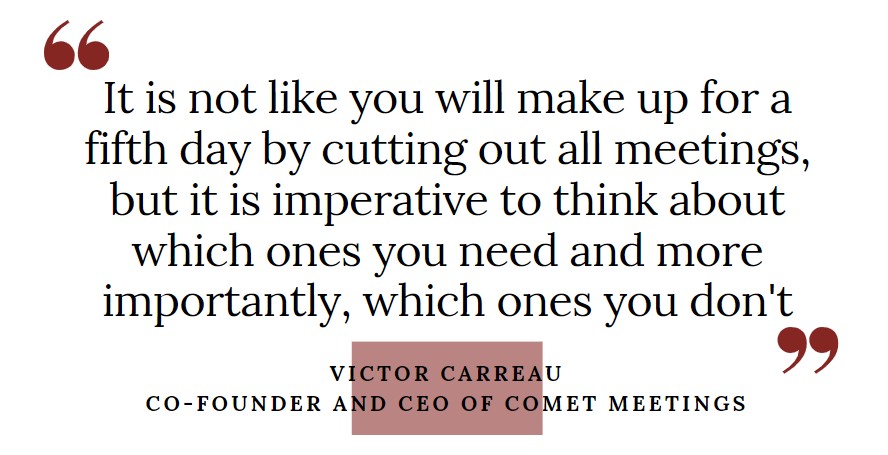Following the successful introduction of a four-day working week pilot project in the United Kingdom, several companies in Belgium have also implemented this system. They have hailed it as the solution for employees to find a better work-life balance.
In November 2022, the Federal Government's new labour deal came into force, focussing on greater flexibility in working hours and locations, and allowing employees greater freedom to arrange their own way of working.
"We see that the new generation is spending less time inside a company and employees are feeling less close to each other. These companies are facing a huge challenge," Victor Carreau, co-founder and CEO of Comet, the company behind Comet Meetings that aims to reshape how companies work together, told The Brussels Times.
The connection between colleagues is often one of the main reasons why people stick to a company, he said. "Just like with remote work, the four-day work week means that we spend less time together – and so it needs to be more efficient and meaningful."
Cutting unimportant meetings
Going in person to a shared workplace does not lead to more work being done: numerous studies have shown that people tend to work better when they are not disturbed by others. For Carreau, the two main reasons to be in the office is "to collaborate on ideas and push projects forward with your team, and socialising to create a connection with your colleagues and the company itself."
With the four-day working week, the working days become more intense and daily structures need to adapt: "An important aspect of this is meetings, and how of them we attend," Carreau said.
Comet Meetings distinguished two types of meetings: the quick ones – which many employees often say "could have been an email" – are scheduled too often; it's the bigger ones that count – not just to drive a project but to (re)create a link between colleagues, especially if they come into the office less often.
"The more we do remote work and the fewer days we spend working, the more important it is to cut out that first category of meetings and focus on the second... Especially among the new generation of workers, we see that they want a feeling of belonging and purpose in the company culture."
The average employee in Belgium spends just over a day per week in meetings. Over 50% of people said that they were often invited without knowing why; nearly 90% regularly said the meeting they attended was useless.
"It is not that you will just make up for that fifth day by cutting out all meetings but it is imperative to think about which you need and which ones you don't. By not having unimportant meetings, we can already gain several hours per week or even half a day."
Yet critics have argued that in practice a four-day working week will not deliver on its promises of a better work-life balance. They say that working ten-hour days reduces downtime in the evenings. They add that many people will work or check emails on their days off.
'Double-edged sword'
Carreau acknowledged that the system can be "a double-edged sword," saying that if companies do not put in place clear boundaries and structures to enforce this four-day week, it will indeed not work. "I am not saying that emails should be disconnected on the fifth day, but I think that if there is a healthy company culture and the leadership team sets the right example – by never answering emails or taking calls on the fifth day, for example – then it can definitely work."
An important point of discussion is how to organise a regular five-day week into a four-day one. Will employees have to work the same number of hours, or will the hours be reduced by 20%?
A pilot project in the UK had success with the latter. "The key is for the productivity gains to be significant enough for companies to agree to pay employees for 100% of the week while only getting 80% labour time," said Carreau.
In Belgium, the new labour deal states that every employee can apply for a full-time four-day working week; the usual +/- 38-hour week could then be performed in four 9.5-hour days instead of five 7.6-hour days. A recent survey shows that 40% of workers in Flanders are in favour of this new approach, but the system has not been in force long enough – just four months – to analyse its effect.
Related News
- Four-day working week comes into effect. Who can use it and how to apply?
- 40% of Flemish employees want four-day working week
- Belgian companies expecting rise in employee demand for flexibility at work
While not all sectors would be able to work like this, Carreau underlined the importance of the system being introduced in such a way that working four days is allowed, unless companies refuse. "That means that employees do not have the mental roadblock where they need to make their case and ask for permission."
All the same, this would certainly be a huge change in the way companies operate wouldn't happen overnight. "We have to introduce it in a smart and agile way because we are stretching the model of how we work. But as we test the model's flexibility, we need to make sure we don't break what is holding our companies together."
"During the pandemic, remote work has proven that it is a great opportunity for all of us. Over the next months and years, we will see if the four-day working week will show whether it is as well," Carreau said. "But people are our companies' biggest assets, and the only way to keep thriving if is employees stay connected to each other."


